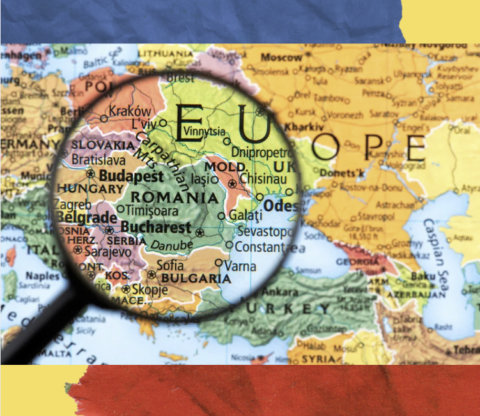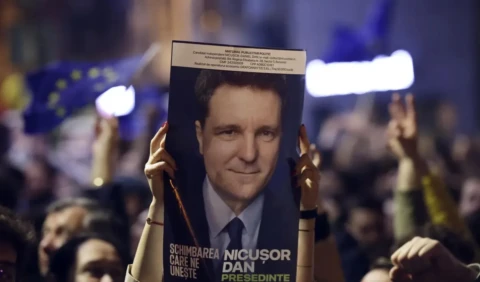Bridges, Not Borders. The Votes of a Disconnected Nation & Why The Diaspora Still Cares
The Dilemma of a Disconnected Diaspora
I am part of the Romanian diaspora. I DO NOT live in the West so I can vote Romania out of the West. At first, this move really felt like an ironic contradiction, even hypocritical. How can people vote for an Anti-EU, extremely radicalized candidate? How can they vote for a bully who appears as a ultranationalist and a Christian only to attract votes? I’d think of their educational gaps or their economic situation as reasons for „poor lacks of judgement”.
But the more I think about it, the more I believe it to be a desperate cry. A desperate call of a diaspora caught between two worlds.
This radical vote was the vote of a mother or father who had to leave their children behind to earn a living wage abroad. Their kids were raised by elderly grandparents, perhaps even a sick and frail grandma or grandpa. They missed countless birthdays, graduations, and some of them… first steps, connecting only through blurry video calls (do we remember the Skype of 2005-2010?) and fleeting quick summer visits if they had enough money or if their employers allowed them to (don’t get me started on their working conditions). Over time, their family bond frayed. The parents struggled to reintegrate when and if they tried to come back, feeling like strangers in the land they once called home. Meanwhile, the children left behind faced their own struggles. A fragmented education, big gaps in emotional support, and the quiet pain of absence, not to mention a system that would fail them and their caretakers everyday. For many, their paths got shaped by survival instincts rather than real opportunities for growth and education, and they often grew up resenting a system that forced their families apart. Wouldn’t you?
Does it really seem impossible that they would vote for a candidate that promises a home where they could be together, live in prosperity, and in fact, a Romania that has never been?

(Re)building a Bridge
Beyond the necessity (and quite frankly, the obligation) to rebuild the relationship with the diaspora (a whooping 14.3% of the total valid votes this presidential election came from Romanians who no longer live in Romania), the new political class which we very hopefully voted into power, will require a lot of action. Tangible efforts. We’d first have to be recognized as an essential part of the national identity, not just a source of remittances.
- Total valid votes at the Presidential Election: 11,507,695
- Total votes expressed outside of Romania: 1,645,327
- 14.3% of all votes came from the Diaspora.
- In 2023, Romanians living abroad sent home a record $7 billion, accounting for approximately 2% of Romania’s GDP. This figure is nearly equivalent to the country’s foreign direct investment inflows.
Keeping in mind the large number of people who left the country (*”Report: Romanian diaspora, fifth largest in the world” per a 2019 article or “second after Syrian refugees” according to the UN in 2023), the diaspora’s economic importance, the 1 in 2 radicalized voter, I see today as a key moment that requires collaboration across party lines, a clear vision for the country, a commitment to integrity and transparency, and I can’t wait to see how they will engage diaspora. We, the ones who left the building but did not throw away the keys, continue to contribute in countless ways and make great efforts to help, promote, and upkeep the Romanian society, culture, values and traditions. I am hopeful we’re assisting the beginning of a deeper, more meaningful partnership between the government in Bucharest and the diaspora.

A New President and a Harsh Economic Reality
Beyond the relationship with diaspora, the new president and his (soon to be new) government faces another critical challenge, specifically our country’s budget deficit which recently climbed to 8.6% of GDP, surpassing the EU’s recommended 3% threshold and placing increased pressure for sustainable fiscal solutions. „The European Commission has revised down its economic forecast for Romania, predicting a modest GDP growth of just 1.4% in 2025 – below the 2.5% projected in its previous autumn outlook.” per Romania-Insider.com
Countries like Poland and Ireland, once similarly constrained, managed to turn their economies around by prioritizing innovation, export growth, and fiscal discipline. Poland’s focus on technology exports, EU integration, and targeted infrastructure investments helped transform its economy into one of the fastest-growing in Europe. Ireland, with its business-friendly tax policies, strategic FDI attraction, and emphasis on education, became a tech and pharmaceutical powerhouse.
Romania can draw on this experience in a number of ways. I believe we’d benefit strongly from strengthening our export capabilities, from investing in digital infrastructure/tech education, from modernizing the administrative system (reduce all the bureaucratic hurdles) and the tax system (encourage business formation and foreign investment).
With a PhD in mathematics from the Sorbonne and two Gold International Mathematics Olympiad Medals (1987, 1988), Nicușor Dan stands among a rare group of just 25 people in history to achieve this level of intellectual excellence. Romania, which I am very, very proud of at the moment!, voted for a president with a proven track record of analytical rigor, a promising sign as we need clear minded, data-driven, selfless leadership, without all the corrupt hidden agendas that we got used to.

Photo Source: https://efe.com/en/latest-news/2025-05-19/pro-eu-nicusor-dan-wins-presidential-election-in-romania/
Diaspora – From Financial Support to Strategic Partners
If our new president and his administration are truly committed to reform, they will need to harness the potential of the diaspora not just as a financial resource, but as a strategic partner in nation-building. This means creating conditions that encourage return migration, investing in the education of the next generation, and building a system that rewards innovation and honesty, not political connections and short-term gains.
I imagine a Romania where its global citizens don’t just send money home but return to build businesses, innovate industries, and lead communities. A Romania that treats its diaspora not just as a safety net in times of crisis, but as a vital force in its long-term prosperity. If its leaders can embrace this partnership, they will not only bridge the emotional and physical distances that separate us, but also lay the foundation for a more resilient nation, regardless of distance.
And perhaps one day, when we cast our votes, we won’t do so from a place of despair or disillusionment, but from a place of genuine hope and belonging.
Roxana Nistor Bridges, Not Borders. The Votes of a Disconnected Nation & Why The Diaspora Still Cares May 19, 2025
#ThereIsHope #Romania #Leadership #Innovation #EconomicGrowth #Europe
